If you're curious about the world of espionage, I recommend checking out "The Art of Intelligence" to understand CIA operations after 9/11. For a look into the life of agency officers, "CIA 101" offers a great overview. "The Craft of Intelligence" presents fascinating insights from a former CIA Director, while "The Making of a Spy" captures personal transformation. Each memoir reflects unique experiences and lessons. Stick around, and you'll discover even more intriguing titles!
Key Takeaways
- "The Art of Intelligence" offers engaging narratives on espionage and national security, highlighting moral complexities in intelligence operations post-9/11.
- "Open Secrets" reveals political intrigue within India's Intelligence Bureau, providing insights into modern Indian history and the challenges of accountability.
- "By All Means Available" shares firsthand accounts of military strategy and covert operations, ideal for readers interested in the inner workings of intelligence.
- "War of Numbers" critiques the ethical dilemmas in intelligence work, focusing on the consequences of misleading intelligence during the Vietnam War.
- "The Making of a Spy" chronicles the journey from boy soldier to intelligence agent, showcasing resilience and gritty insights into the life of a spy.
The Art of Intelligence: Lessons from a Life in the CIA's Clandestine Service
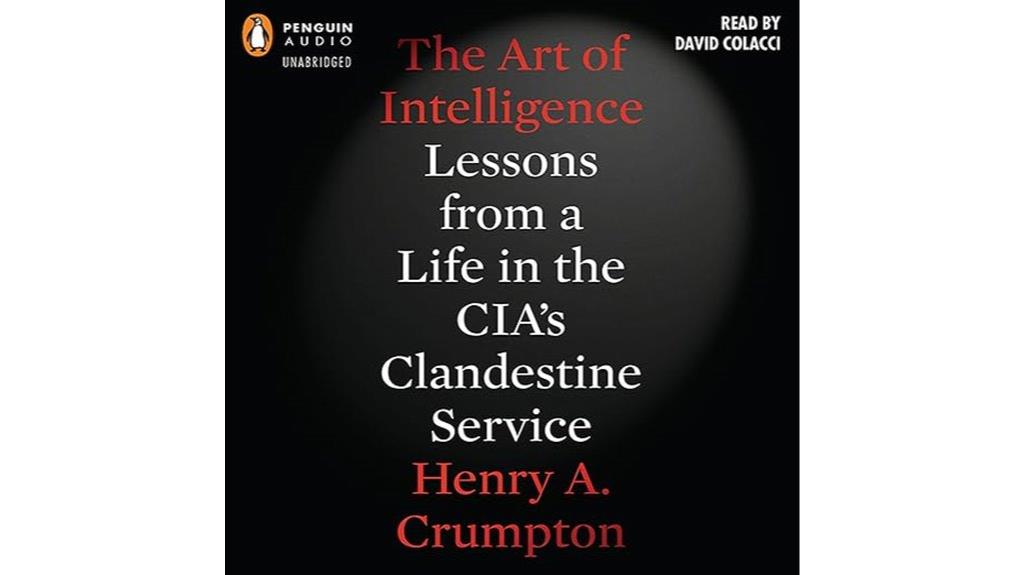
If you're fascinated by the intricacies of espionage and want to understand the real-life challenges faced by intelligence operatives, "The Art of Intelligence" is a must-read. Henry Crumpton's firsthand accounts from his CIA career, especially during the Afghanistan campaign post-9/11, provide a gripping look at covert operations. He emphasizes the shift to asymmetric warfare and the importance of forging alliances for intelligence gathering. Crumpton candidly critiques political failures that hindered effective responses and shares personal reflections on the moral complexities of his work. This book isn't just about espionage; it's an engaging narrative that sheds light on national security's evolving landscape.
Best For: Readers interested in espionage, national security, and real-life accounts of intelligence work from a seasoned CIA operative.
Pros:
- Engaging narrative that makes complex intelligence operations relatable and informative.
- Insights into counterterrorism strategies and the importance of building local alliances during covert missions.
- Candid critiques of political challenges faced by intelligence agencies, providing a deeper understanding of operational difficulties.
Cons:
- May not satisfy readers looking for a typical action thriller due to its realistic portrayal of espionage.
- Some readers might find the political critiques too heavy or detailed compared to personal accounts.
- Lacks a traditional plot structure, which may not appeal to those preferring more fictionalized stories.
CIA 101: A Crash Course in Agency Case Officers
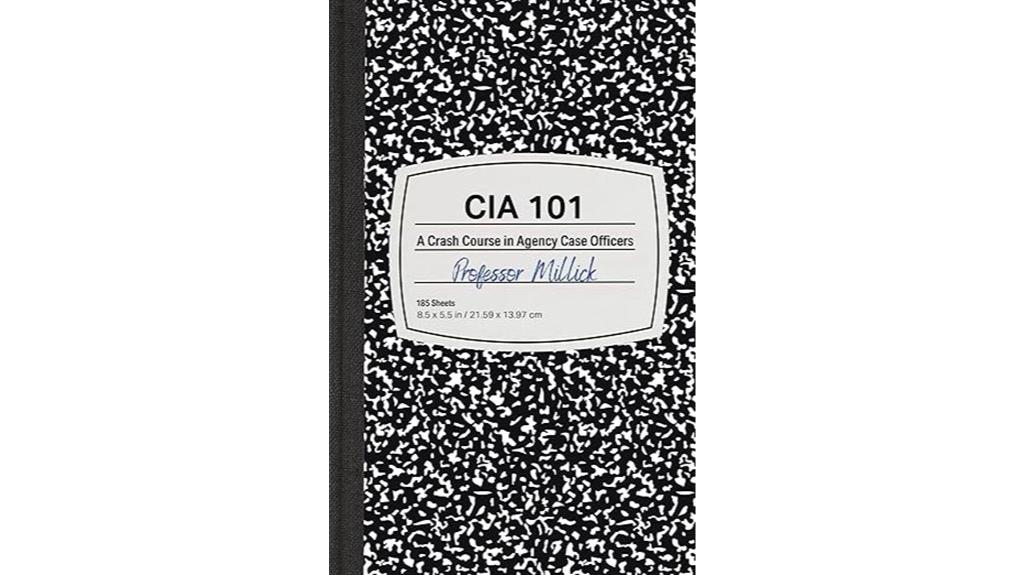
"Intelligence Memoirs" is perfect for anyone curious about the inner workings of the CIA, especially those considering a career as a case officer. In "CIA 101" by Professor Millick, I found a clear glimpse into the life of CIA operatives, dispelling common myths. Millick's insights reveal the Agency's conservative culture and the often isolating bureaucracy that can stifle innovation. His personal reflections highlight the disillusionment many feel when reality doesn't match expectations. While the book has its repetitive moments, it's an engaging introduction to the complexities and risks of intelligence work. It's a must-read for aspiring agents.
Best For: Those interested in understanding the realities of CIA operations and aspiring case officers looking for an insightful introduction to the field.
Pros:
- Provides a clear and engaging overview of the life and work of CIA case officers.
- Offers personal reflections that resonate with those feeling disillusioned in public service roles.
- Serves as a valuable starting point for understanding the complexities and risks associated with intelligence work.
Cons:
- Contains some repetitive elements and philosophical digressions that may detract from the main narrative.
- Lacks detailed accounts of specific encounters due to disclosure laws.
- Mixed reviews indicate that some readers feel the content could be more concise.
The Craft of Intelligence: America's Legendary Spy Master on Intelligence Gathering
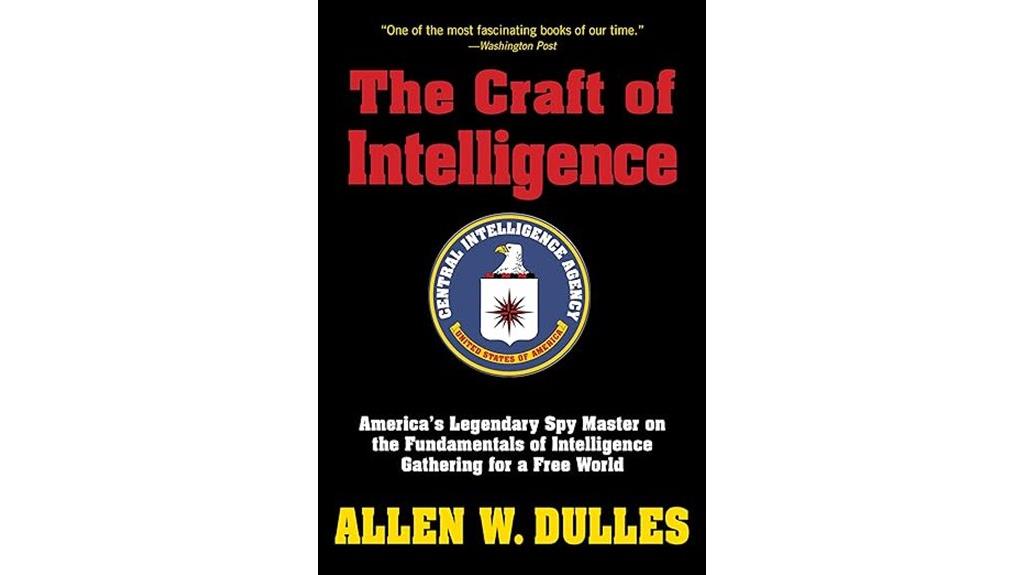
For anyone enthusiastic to plunge into the intricate world of espionage, "The Craft of Intelligence" by Allen W. Dulles is a must-read. As a former CIA Director, Dulles offers fascinating insights into intelligence gathering during the Cold War. He details the complexities of penetrating Soviet satellite nations while sharing personal anecdotes that illustrate real-world challenges. Dulles contrasts the secrecy of Soviet operations with American transparency, revealing the tensions between national security and public accountability. This book serves as an essential resource for beginners, making complex intelligence concepts accessible and engaging—perfect for anyone curious about the art of espionage.
Best For: Individuals interested in the history of intelligence, espionage, and the Cold War dynamics, as well as beginners seeking to understand intelligence concepts.
Pros:
- Provides firsthand insights from a former CIA Director with extensive experience in intelligence operations.
- Engaging writing style that makes complex intelligence topics accessible to a general audience.
- Offers valuable historical context and anecdotes that illustrate the realities of Cold War espionage.
Cons:
- Some content may feel dated due to the historical context of the Cold War.
- Lacks detailed discussion of specific national secrets, which might disappoint readers looking for classified information.
- Focuses primarily on American intelligence, potentially limiting perspectives on global intelligence practices.
The Worlds I See: Curiosity, Exploration, and Discovery at the Dawn of AI
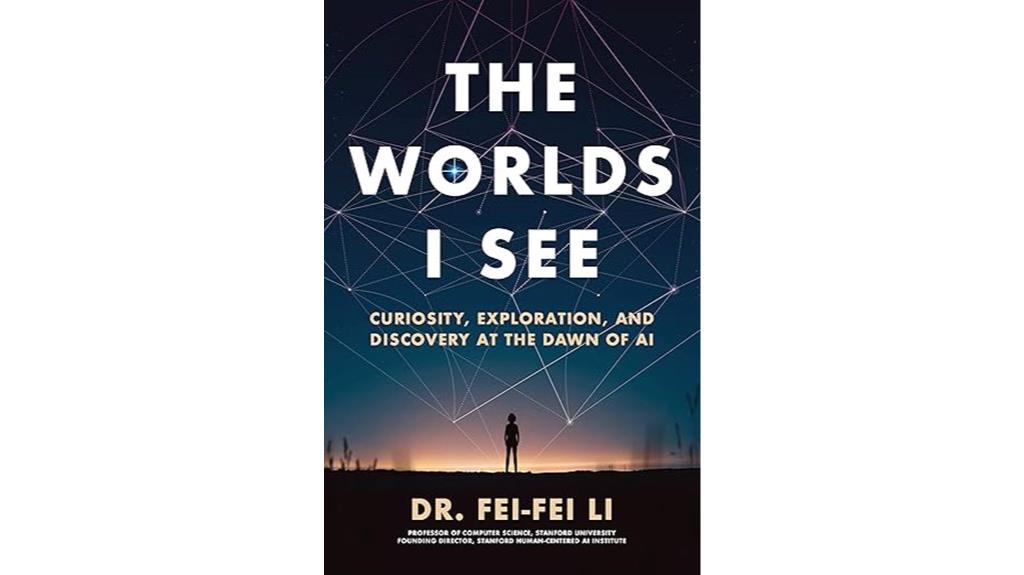
Readers seeking inspiration from the intersection of personal struggle and groundbreaking scientific achievement will find "The Worlds I See" a compelling choice. Dr. Fei-Fei Li takes us on her journey from China to becoming a leader in AI. She candidly shares her challenges—from language barriers to personal loss—while highlighting the significance of teamwork in scientific progress. Her creation of ImageNet revolutionized image recognition and embodies her human-centered approach to AI. This memoir not only illuminates her remarkable achievements but also offers profound insights into the ethical implications of technology, making it a must-read for anyone curious about AI's future.
Best For: Readers interested in the personal stories behind scientific innovation and the ethical dimensions of artificial intelligence.
Pros:
- Engaging narrative: Dr. Li's storytelling captivates readers, blending personal experiences with scientific achievements.
- Inspirational journey: The memoir showcases resilience and perseverance in overcoming challenges, making it relatable to many.
- Insightful exploration: Offers a deep understanding of AI's evolution and its implications for humanity, appealing to both tech enthusiasts and general readers.
Cons:
- Niche focus: Those less interested in AI or personal memoirs may find the content less engaging.
- Technical depth: Some readers may seek more technical details about AI advancements beyond the autobiographical elements.
- Emotional weight: The personal struggles presented may be heavy for some readers, potentially overshadowing the scientific achievements.
A Measure of Intelligence: One Mothers Reckoning with the IQ Test

If you're a parent or educator grappling with the complexities of IQ testing and its impact on children with disabilities, "A Measure of Intelligence: One Mother's Reckoning with the IQ Test" offers a profound perspective. Pepper Stetler shares her journey as a mother of a daughter with Down Syndrome, challenging the flaws inherent in IQ tests. She highlights how these assessments can obstruct access to essential services and calls for a reevaluation of how we measure intelligence. This insightful memoir blends personal narrative with advocacy, pushing us to reconsider how we honor the unique strengths of every individual, especially those facing systemic barriers.
Best For: Individuals in education, psychology, and disability services seeking a deeper understanding of IQ testing and its implications for children with disabilities.
Pros:
- Offers a personal and emotional narrative that highlights the real-life impact of IQ testing on families.
- Critiques systemic flaws in the use of IQ tests, advocating for a more inclusive approach to measuring intelligence.
- Encourages readers to rethink traditional paradigms and consider the unique strengths of individuals with disabilities.
Cons:
- May not provide a comprehensive solution to the systemic issues raised, leaving readers seeking actionable steps.
- The focus on personal advocacy might overshadow broader statistical or scientific analyses of IQ testing.
- Potentially limited appeal for those outside the fields of education and disability services who may not relate to the personal narrative.
A Synthesizing Mind: A Memoir from the Creator of Multiple Intelligences Theory
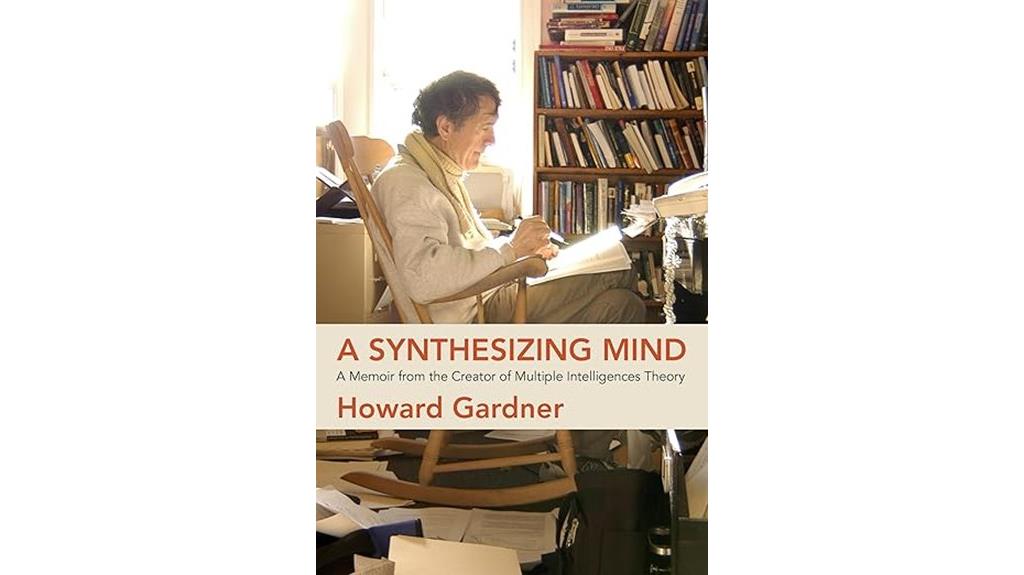
A Synthesizing Mind is an essential read for educators and scholars seeking a deeper understanding of how to foster critical thinking and creativity in their students. In my memoir, I reflect on my journey from a bookish child to a Harvard professor and the development of the multiple intelligences theory. I emphasize the "synthesizing mind," a vital skill for maneuvering our information-rich world. Throughout the book, I share personal anecdotes and practical strategies for teaching synthesis, encouraging readers to cultivate their own synthesizing abilities. It's a call to action for curious thinkers enthusiastic to explore the depths of knowledge and creativity.
Best For: Educators and scholars looking to enhance their teaching methods and foster critical thinking skills in their students.
Pros:
- Provides practical strategies for teaching synthesis and critical thinking.
- Shares personal anecdotes that offer valuable insights into the academic journey.
- Encourages lifelong learning and curiosity among readers.
Cons:
- Some critiques mention the author's tendency toward self-promotion.
- The complexity of ideas may be challenging for some readers to fully grasp.
- May not appeal to those seeking a straightforward or simplified guide to education.
Potsdam Mission: Memoir of a U.S. Army Intelligence Officer
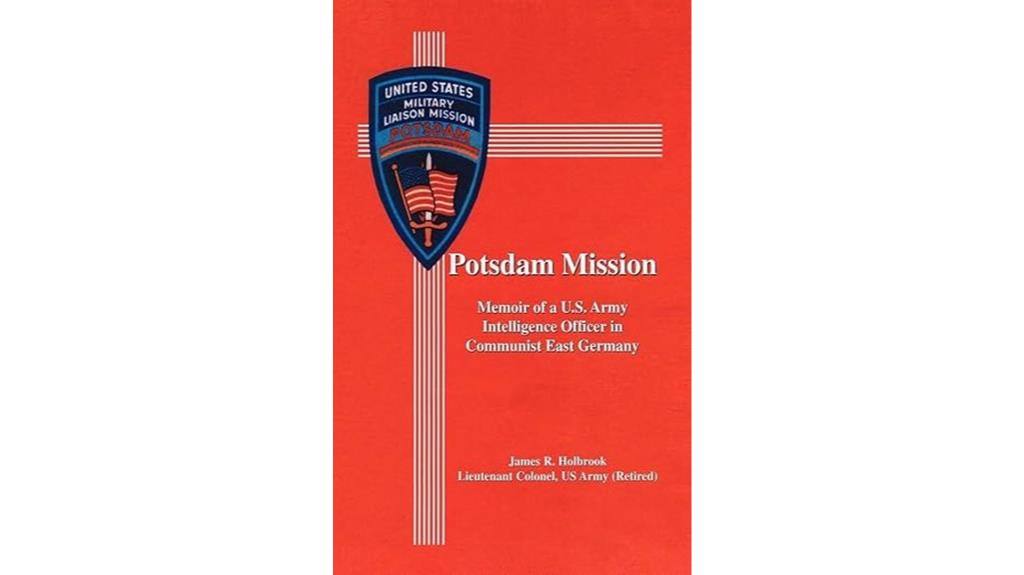
For those fascinated by Cold War espionage and military operations, "Potsdam Mission: Memoir of a U.S. Army Intelligence Officer" offers gripping insights from my time in East Germany. As a young military policeman during Operation Cervine Twist, I faced the challenges of gathering intelligence amidst the ever-present threat of Soviet forces. My experiences, from harrowing encounters with the Stasi to the adrenaline of securing a high-ranking general's visit, highlight the complexities of military life. This memoir not only recounts missions but also reveals the human side of intelligence work, making it a must-read for anyone intrigued by this pivotal era.
Best For: Readers interested in Cold War history, military operations, and personal accounts of intelligence work.
Pros:
- Engaging narrative that provides a personal perspective on military life during the Cold War.
- Detailed accounts of unique experiences and challenges faced by intelligence officers in East Germany.
- Recently declassified documents enhance the historical significance of the memoir.
Cons:
- Printing quality issues may detract from the reading experience.
- Some readers may desire more comprehensive coverage of specific missions.
- Limited exploration of broader geopolitical implications beyond personal experiences.
Mixed Girl – How She Got So Weird

Victoria Cortez's "Mixed Girl: How She Got So Weird" resonates deeply with anyone grappling with their identity in a world that often demands conformity. As a mixed-race child in a largely Hispanic community, I felt the sting of being an outsider. Through her raw prose, Victoria bravely navigates her struggles with addiction and unhealthy relationships, revealing the lingering insecurities from her childhood. Her journey of resilience and healing, fueled by the transformative power of motherhood, offers a beacon of hope. This memoir is a heartfelt reminder to embrace our unique identities, even when we feel lost or misunderstood.
Best For: Readers seeking an authentic exploration of identity and resilience through the experiences of a mixed-race individual.
Pros:
- Authentic Voice: Victoria Cortez shares her personal journey with raw honesty, making it relatable for many.
- Inspirational Themes: The memoir emphasizes hope and acceptance, encouraging readers to embrace their unique identities.
- Emotional Depth: The narrative offers a deep exploration of personal struggles and the transformative power of motherhood.
Cons:
- Sensitive Content: Some readers may find the discussions of addiction and unhealthy relationships triggering.
- Niche Appeal: The focus on a mixed-race experience may not resonate with all audiences.
- Pacing Issues: Some readers might feel the memoir's pacing is uneven, affecting the flow of the narrative.
Girl Decoded: A Scientist's Quest for Emotional Intelligence in Technology
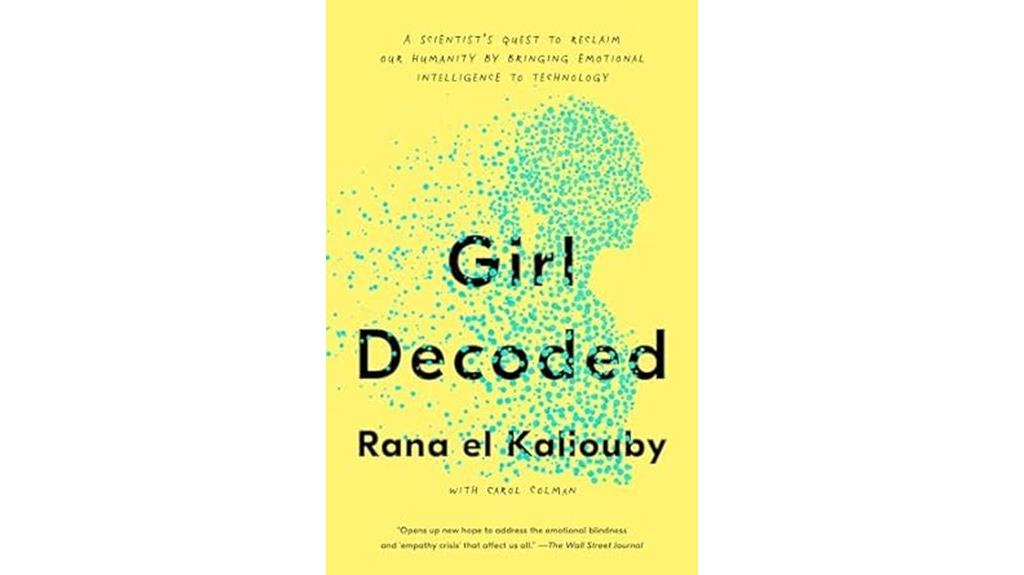
If you're someone who's intrigued by the intersection of technology and emotional intelligence, "Girl Decoded" by Rana el Kaliouby is a must-read. This memoir captures her inspiring journey as she pioneers Emotion AI, working to humanize technology. El Kaliouby shares her struggles and triumphs as an Egyptian American Muslim woman in a male-dominated field, encouraging readers to embrace their potential. Her insights into how machines can understand human emotions through nonverbal cues are fascinating, emphasizing empathy in digital interactions. With rich cultural narratives and personal anecdotes, this book resonates deeply, making it a powerful reflection of resilience and innovation.
Best For: Individuals interested in technology, emotional intelligence, and inspiring stories of overcoming cultural and gender barriers in STEM fields.
Pros:
- Empowering narrative that encourages women to pursue their passions in male-dominated industries.
- Insightful exploration of how Emotion AI can enhance human interaction and foster empathy.
- Rich cultural insights that provide a relatable perspective on balancing personal and professional life.
Cons:
- Personal anecdotes may not resonate with all readers, particularly those outside of STEM.
- Focused on one woman's journey, which may limit broader applicability to all women in tech.
- Technical content may be challenging for readers without a background in technology or AI.
War of Numbers: An Intelligence Memoir of the Vietnam Wars
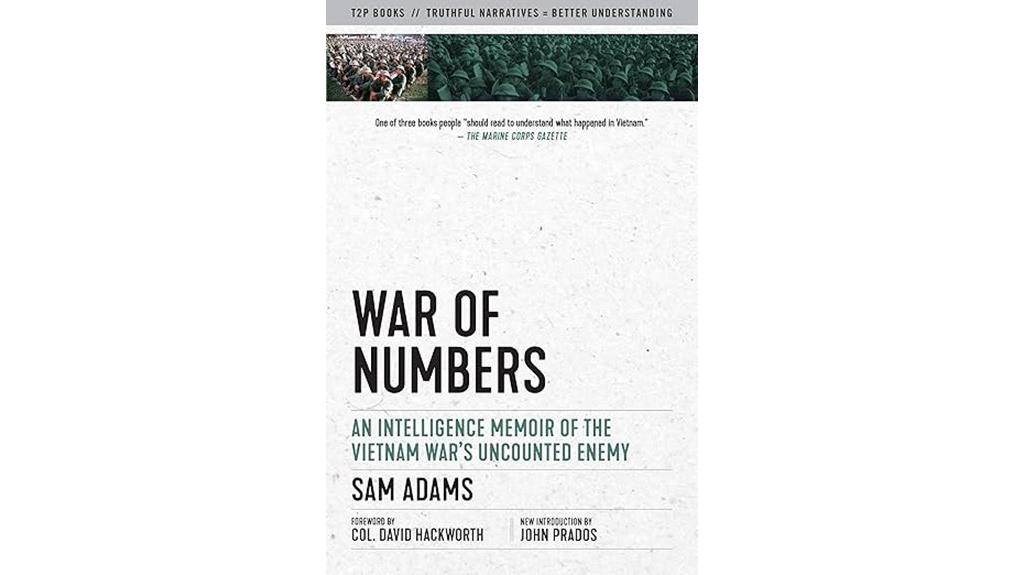
In "War of Numbers: An Intelligence Memoir of the Vietnam Wars," readers will find an enthralling account that reveals the often hidden truths of the Vietnam War through the eyes of CIA analyst Sam Adams. I was drawn into Adams' relentless pursuit of truth, challenging misleading military reports that painted a rosier picture of enemy strength. His assertion that the war was unwinnable resonates deeply, exposing the dangers of politicized intelligence. Adams' findings ignited media scrutiny, leading to significant revelations about military leadership's failures. This memoir is a powerful reminder of how distorted information can alter the course of history.
Best For: Readers interested in an honest and critical perspective on the Vietnam War, particularly those who value intelligence analysis and historical accuracy.
Pros:
- Insightful Analysis: Offers a unique viewpoint from a CIA analyst, challenging official narratives and revealing the complexities of war.
- Engaging Writing: Adams' compelling prose captivates readers, making the historical account both informative and engaging.
- Historical Impact: Highlights the consequences of misleading intelligence, prompting reflection on the importance of truthful reporting in military contexts.
Cons:
- Subjective Perspective: As a memoir, the narrative may reflect personal biases and opinions that could influence readers' interpretations.
- Dense Content: The analytical nature of the text may be challenging for those seeking a lighter read or general overview of the Vietnam War.
- Limited Coverage of Broader Context: Focuses primarily on intelligence issues, potentially overlooking other significant aspects of the Vietnam War.
War of Numbers: An Intelligence Memoir
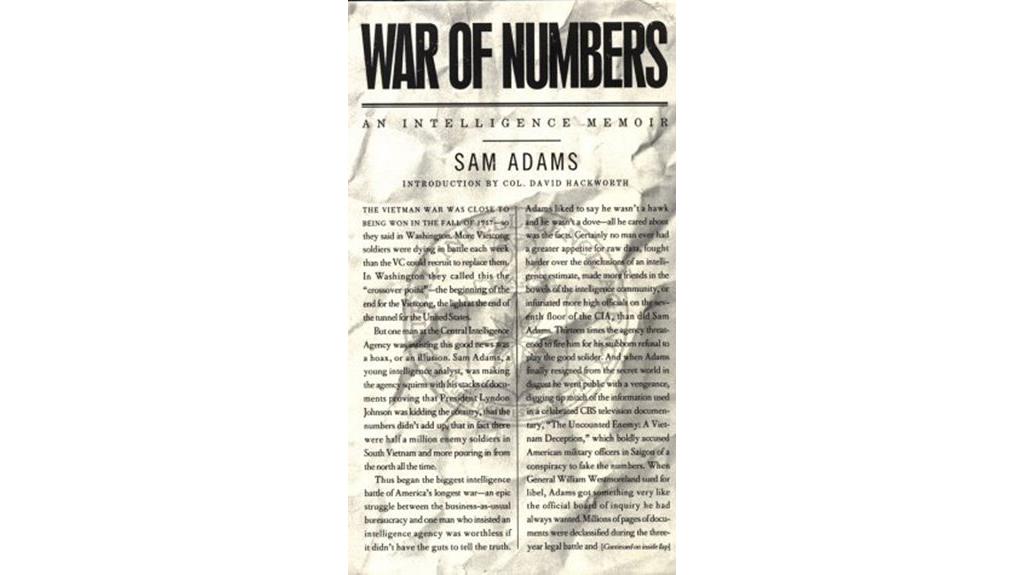
For anyone seeking a deeper understanding of the complexities behind the Vietnam War, "War of Numbers: An Intelligence Memoir" is an essential read. Sam Adams, a former CIA analyst, exposes the shocking discrepancies in troop estimates during the Tet Offensive. His detailed analysis, often overshadowed by military pressure, reveals how misinformation fueled public disillusionment and LBJ's withdrawal from the presidency. As a whistleblower, Adams faced significant challenges in maintaining integrity against institutional suppression. This memoir not only informs but also serves as a cautionary tale about the ethical dilemmas in intelligence work, making it a compelling read for history enthusiasts.
Best For: Those interested in military history and intelligence analysis, particularly regarding the Vietnam War and the challenges of accurate reporting.
Pros:
- Insightful Analysis: Provides a deep understanding of the discrepancies in troop estimates and their impact on public perception.
- Whistleblower Perspective: Highlights the ethical dilemmas faced by intelligence analysts, offering a unique view of institutional pressures.
- Engaging Narrative: Combines humor with profound themes, making it an approachable read for history enthusiasts.
Cons:
- Limited Historical Context: May not provide a comprehensive overview of the Vietnam War for readers unfamiliar with the subject.
- Complexity of Content: The detailed analysis might be overwhelming for those not well-versed in military and intelligence terminology.
- Focus on Specific Events: Concentrates heavily on the Tet Offensive, potentially leaving out broader aspects of the Vietnam War experience.
Open Secrets: The Explosive Memoirs of an Indian Intelligence Officer
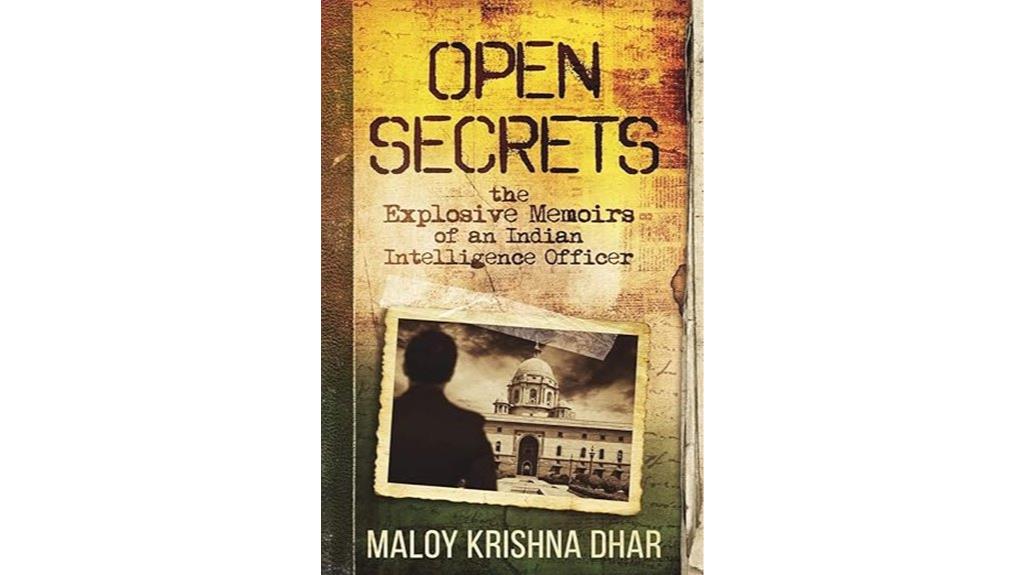
"Open Secrets: The Explosive Memoirs of an Indian Intelligence Officer" stands out as an essential read for anyone intrigued by the inner workings of intelligence and politics in India. Maloy Krishna Dhar's candid recount of his thirty-year journey in the Intelligence Bureau exposes the political intrigue and challenges faced during pivotal moments in Indian history. His insights into Islamic terror and the political landscape are eye-opening, revealing how personal interests often overshadow public service. Although some critiques address his biases, the gripping narratives and detailed accounts make this memoir an informative resource that sparks vital conversations about reform and accountability in India's intelligence systems.
Best For: Those interested in the intricacies of Indian politics and intelligence operations, as well as readers seeking a deeper understanding of modern Indian history.
Pros:
- Offers unique insights into the political machinations and challenges within India's intelligence agencies.
- Engaging storytelling and gripping accounts of pivotal historical events make it an informative read.
- Sparks important discussions about the need for reform, transparency, and accountability in Indian politics.
Cons:
- The author's personal biases may color some narratives, leading to potential controversy.
- Writing quality and editing could have been improved, with some sections feeling mundane.
- Lack of supporting evidence for certain claims may raise questions about the credibility of some revelations.
The Making of a Spy: Memoir of a German Boy Soldier

Readers fascinated by the intricacies of espionage and personal transformation will find "The Making of a Spy: Memoir of a German Boy Soldier" particularly compelling. Gerhardt Thamm's journey from a boy soldier in WWII to a U.S. Army intelligence agent is both harrowing and inspiring. His escape from the Russian Army and shift from a slave laborer to a spy showcases resilience. Thamm's training as a Case Officer offers gritty insights into the real dangers of espionage, far removed from fiction. This memoir not only captures his dedication but also highlights the broader struggle for freedom during the Cold War.
Best For: Readers interested in historical memoirs and those who want to explore the personal experiences of individuals involved in espionage during the Cold War.
Pros:
- Engaging narrative that immerses readers in the historical context of post-WWII and the Cold War era.
- Offers unique insights into the complexities of espionage, differentiating between real-life experiences and fictional portrayals.
- Includes photographs and sketches that enrich the storytelling and provide a visual connection to Thamm's journey.
Cons:
- Some readers may find the memoir's focus on military and intelligence operations less appealing if they prefer more traditional historical accounts.
- The intense themes of danger and personal risk may be unsettling for some audiences.
- As a memoir, it may lack the broader historical analysis that some readers expect from non-fiction works on the Cold War.
By All Means Available: Memoirs of a Life in Intelligence
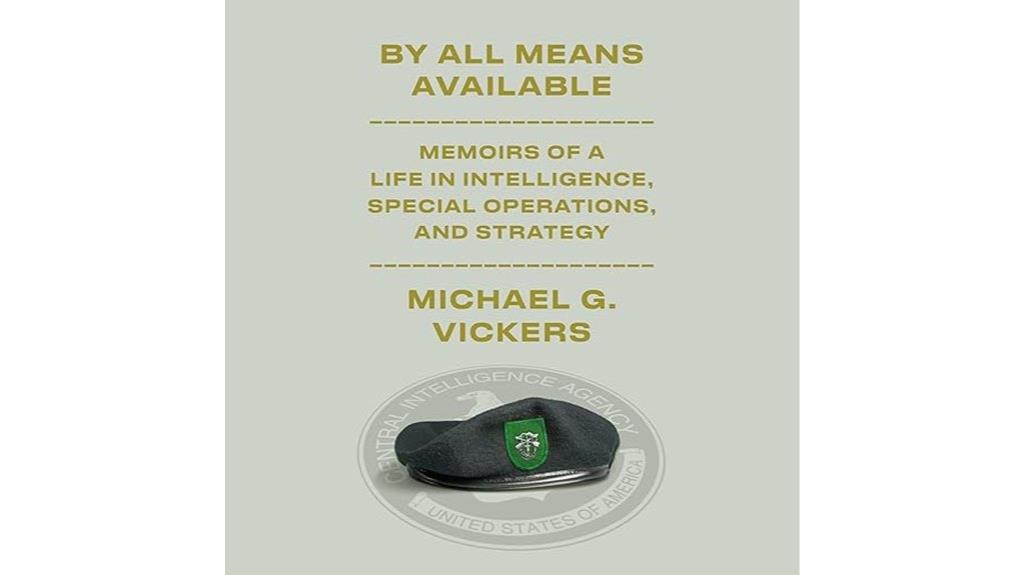
"By All Means Available" stands out as an essential read for anyone intrigued by the intricate world of military and intelligence operations. Michael Vickers takes us on a gripping journey through his remarkable career, from an enlisted Green Beret to a key player in the CIA and Department of Defense. His firsthand accounts of the covert war in Afghanistan and strategic insights during the Global War on Terror are invaluable. Vickers emphasizes quiet leadership and innovative strategies, making this memoir not just a narrative but a guide for future challenges. It's a must-read for anyone passionate about national security and military history.
Best For: Those interested in military strategy, intelligence operations, and leadership insights from an insider's perspective.
Pros:
- Offers detailed firsthand accounts of significant military and intelligence operations.
- Provides valuable lessons in leadership and strategic innovation.
- Engaging writing style that makes complex topics accessible to a broader audience.
Cons:
- Some readers may find the level of detail overwhelming at times.
- The later chapters may come across as repetitive and self-centered.
- May not appeal to those seeking a purely historical or academic analysis.
For Lust of Knowing: Memoirs of an Intelligence Officer

Those seeking an insider's perspective on intelligence operations during pivotal moments in history will find "For Lust of Knowing: Memoirs of an Intelligence Officer" particularly compelling. Authored by Mr. Roosevelt, a skilled linguist and patriotic American, the memoir blends personal experiences with political commentary. While I appreciate his insights into U.S. and Soviet influences in the Middle East, I can't help but notice his tendency to oversimplify complex issues. His critiques of American perspectives often lack context, and his understanding of local desires for stability feels superficial. This memoir offers valuable lessons, though it sometimes misses the mark on deeper regional dynamics.
Best For: Readers interested in personal narratives about intelligence operations during the Cold War and U.S. involvement in the Middle East.
Pros:
- Offers a unique insider's perspective on historical intelligence operations.
- Combines memoir with political commentary, making it engaging for those interested in geopolitics.
- Highlights the complexities of U.S. and Soviet influence in the Middle East.
Cons:
- Lacks transparency regarding significant details of Roosevelt's intelligence work.
- Oversimplifies complex geopolitical issues, framing them as a binary conflict.
- Provides a superficial understanding of local populations' desires for stability and governance.
Factors to Consider When Choosing Intelligence Memoirs

When I'm picking an intelligence memoir, I always consider the author's background and credentials first—it's essential to know their experience. I also look at the narrative style; a compelling story keeps me engaged while I'm learning about the nuances of intelligence operations. Finally, I can't overlook the historical context and accuracy, as these factors shape my understanding of the events being discussed.
Author's Background and Credentials
Choosing the right intelligence memoir can be a challenging task, but considering the author's background and credentials is essential. I always look for authors who've held prominent positions in intelligence agencies or the military; this experience lends authenticity to their narratives. Formal training in intelligence work can deepen their insights into complex issues, which I find incredibly valuable. I also pay attention to personal stories that illustrate their involvement in significant events, as these lend credibility and richness to the memoir. Awards or recognition in the field can indicate respect and expertise. Finally, I appreciate authors who offer balanced perspectives, especially if they've navigated diverse regions or political contexts, enhancing the memoir's relevance and insight.
Narrative Style and Engagement
A enchanting narrative style can make or break an intelligence memoir, and I often find that the best ones draw me in with personal anecdotes and vivid storytelling. When authors weave emotional reflections and moral complexities into their narratives, like in "The Art of Intelligence," it humanizes the often cold world of espionage. Humor and unique insights, as showcased in "CIA 101," lighten the serious nature of intelligence work, keeping me engaged. I also appreciate memoirs that blend personal experiences with broader historical contexts, like "War of Numbers," offering a richer understanding of intelligence operations. Ultimately, a memoir's ability to maintain my interest hinges on pacing, clarity, and the way it intertwines personal growth with professional challenges.
Historical Context and Accuracy
Engaging narratives in intelligence memoirs often set the stage for deeper exploration of historical context and accuracy. When I read these memoirs, I consider how authors reflect on pivotal geopolitical events, like the Cold War or the Vietnam War, which shape their insights. Accuracy matters, too; personal biases can skew the portrayal of events, and discrepancies may arise between an author's narrative and established facts. I find it intriguing how political pressures influence intelligence operations, often affecting transparency in reporting. Many memoirs offer firsthand accounts of specific missions, allowing me to compare their recollections with documented histories. Ultimately, the author's background and access to classified information can impact credibility, shaping how I interpret their experiences and motivations.
Insights on Intelligence Operations
While delving into intelligence memoirs, I find it essential to contemplate several factors that can greatly shape my understanding of operations. Firsthand accounts of covert missions reveal the complexities and challenges faced by operatives, adding depth to my knowledge of gathering critical information during conflicts. I appreciate narratives that discuss asymmetric warfare, as they highlight the importance of building networks with local allies. Memoirs that critique political and bureaucratic obstacles within intelligence agencies also resonate with me, showcasing how these issues can impede effective decision-making. Ultimately, the historical context enriches my perspective on the geopolitical dynamics at play, helping me grasp the evolution of strategies used against various threats. These elements truly enhance my reading experience.
Ethical Considerations and Bias
Understanding the nuances of intelligence operations requires a vital lens, especially when it comes to ethical considerations and bias in memoirs. When I evaluate these works, I pay close attention to the author's perspective and potential biases, as their personal experiences can skew narratives toward specific agendas. Memoirs often reflect ideological beliefs and cultural backgrounds, shaping how intelligence operations are portrayed. It's essential to contemplate transparency regarding the author's role; missing details can cloud our understanding of complex ethical dilemmas. I also watch for how authors frame geopolitical conflicts, as oversimplified good versus evil narratives neglect the nuanced realities that local populations face. Finally, examining the ethical implications of decisions on civilian lives reveals much about the author's moral reflections.
Personal Experiences and Anecdotes
When exploring intelligence memoirs, personal experiences and anecdotes provide invaluable insights that can draw you into the complex world of espionage. I've found that accounts from U.S. Army Intelligence Officers, for instance, reveal the high-stakes environments they navigate daily. These memoirs often share the emotional toll and moral dilemmas faced by operatives, illustrating the sacrifices made under constant threat. I appreciate how authors reflect on pivotal moments, like the Tet Offensive, offering firsthand narratives that challenge conventional military perspectives. You'll also discover personal stories of resilience and adaptation, which inspire and highlight the skills required for success in the field. These experiences truly humanize the often-glamorized world of espionage, making it relatable and compelling.
Relevance to Current Affairs
Personal experiences in intelligence memoirs offer a rich context for grasping modern geopolitical issues. These firsthand accounts detail historical events that shape ongoing conflicts and international relations, making them crucial for understanding today's world. When I read these memoirs, I notice how they reflect both the failures and successes of past intelligence operations, providing lessons that resonate with contemporary national security strategies. They often critique the political landscapes that influence intelligence work, emphasizing the need for accountability and transparency in governance. Additionally, by exploring the ethical dilemmas faced by intelligence officers, these memoirs spark significant discussions about the moral implications of current practices, balancing security with civil liberties. They truly enhance my perspective on the complexities of modern intelligence.
Frequently Asked Questions
What Are the Most Common Themes in Intelligence Memoirs?
When I immerse myself in intelligence memoirs, I often notice a few common themes. First, the struggle between duty and morality really stands out to me; authors grapple with tough choices. Then, there's the intense pressure of secrecy and the impact it has on personal lives. I also see a recurring theme of betrayal, whether from within or outside. These insights give me a deeper understanding of the complex world these individuals navigate.
How Do Intelligence Memoirs Differ From Fictional Spy Novels?
Isn't it fascinating how reality often outweighs fiction? Intelligence memoirs differ from spy novels because they reveal genuine experiences and insights, not just thrilling plots. I find that memoirs explore the complexities of decision-making, personal struggles, and moral dilemmas that real agents face. While novels provide entertainment, memoirs offer a raw, unfiltered look into the world of espionage, making them invaluable for understanding the true nature of intelligence work.
Are There Any Controversial Memoirs in the Intelligence Community?
Absolutely, there are several controversial memoirs in the intelligence community. One that stands out is "The Spy Who Came in From the Cold" by John le Carré, which, while fictional, sparked intense debate about real espionage practices. Another is "No Easy Day" by Mark Owen, which faced backlash for revealing sensitive details about the Navy SEAL raid that killed Osama bin Laden. These works often blur the line between truth and narrative, igniting discussions about ethics in intelligence.
What Qualifications Do Authors of Intelligence Memoirs Typically Have?
Did you know that about 60% of intelligence memoir authors have served in high-level positions within government agencies? When I explore these memoirs, I find that most authors typically have extensive backgrounds in military or intelligence roles, often with decades of experience. Their firsthand knowledge gives them the credibility to share their stories. They've been involved in critical operations and possess unique insights that enrich our understanding of their complex world.
Can Readers Trust the Accuracy of These Memoirs?
I often wonder if I can trust the accuracy of memoirs I read. While many authors have impressive backgrounds, personal biases can color their accounts. I've noticed that some details may be exaggerated or simplified, making it essential to approach these stories with a critical eye. I like to cross-reference with other sources to get a fuller picture. Ultimately, it's about balancing the thrilling narrative with a healthy dose of skepticism.
Conclusion
In exploring these remarkable intelligence memoirs, you'll uncover a treasure trove of insights that illuminate the shadowy domain of espionage. Each author offers a glimpse into their unique experiences, revealing the delicate dance between secrecy and revelation. As you probe into their narratives, you'll find not just tales of intrigue, but also profound reflections on courage, ethics, and the human condition. So, embrace the journey and let these stories guide you through the enigmatic sphere of intelligence.









